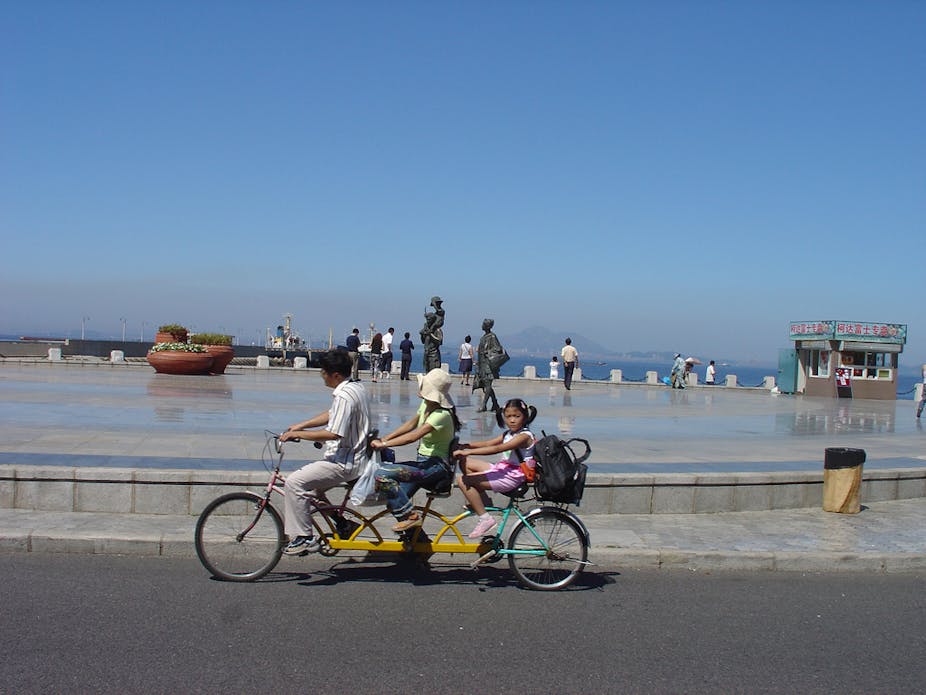Despite the announcements made at the end of last week, the one-child policy is not being abolished in China any time soon, and it will take some dismantling when it is eventually abandoned.
The reform to China’s family planning regulations announced at the Chinese Communist Party Plenum does not amount to the effective abandonment of restrictions on the size of Chinese families. It will probably turn out to be the thin end of a very long wedge which eventually takes us to abolition of all controls, but not for another ten years or so. There are many forces at work that will combine to make the undoing of this policy a tricky process.
Do families want more kids?
The change means that couples will be allowed to have a second child if one spouse is an only child. As such, it will mainly apply to urban couples – rural couples were already permitted a second child if the first was a girl or had a disability – as well as in a few other narrowly defined circumstances which vary by province. Overall, it was estimated prior to this reform that slightly more than half of China’s couples of child-bearing age could have a second child, once permission was applied for and granted, and often only after a fixed period of years since their first child’s birth.

Previously, urban couples both had to be only children to get the second-child concession. The reform will extend that possibility to another 15 to 30 million women. That sounds like a lot but is actually a drop in the ocean if you look at China’s total population, which is currently estimated at around 1.4 billion. So there will be no Xi Jinping-inspired baby boom just yet. That’s one reason why the CCP government felt able to make this concession now.
Unlike rural China, where the real-life economic and social consequences of not having a son are serious, in urban China there is much less pressure to break the one-child policy rules. With many married women working full-time outside the home and a shortage of living space in cities, urban fertility actually fell faster in the ten years of the 1970s before the one-child policy was introduced than it did in the next ten years as it was strictly enforced.
A substantial number of couples eligible for the concession will not want to take advantage of it, leaving perhaps three-fifths who will, at some point, decide to have a second child. Urban services can cope with that, especially as the families of migrants without permanent residence rights in the major cities are still largely excluded from using them.
But on the other hand, the slight uptick in urban births (which will be less gender-skewed than in the countryside, where there are at least 119 boys born now for every 100 girls) will not solve the problem of China’s ageing population, either. This “4-2-1” problem, of one working-age adult with two retired parents and four grandparents to support, is what will eventually persuade the CCP to phase out the system completely, as it will no longer serve the interests of the state.
Vested interests
A change in the rules, whether major or minor, does not mean that the way in which the rules are enforced will change. This is where the most egregious abuses occur and will continue to occur as long as family planning is dictated from above. There has never been any such thing as a trivial breach of the policy. Women have been forced to have abortions within days of their due date for not leaving the required gap between their first and second birth, and we should expect more cases like that of Feng Jianmei.
As more and more adults of child-bearing age leave the countryside, family planning officials struggle to meet their quota for abortions and sterilisations. In order to do so, they target older people instead, such as the 59-year-old man in Yunnan province who died earlier this year in mysterious circumstances after officials took him away for sterilisation. He had been unable to pay a fine levied for allegedly breaking birth quota rules.
Watering down the policy will not put an end to these practices and the interests of those involved in enforcement could frustrate the move towards total abolition too.
When the one-child policy does end, an army of family-planning officials will not only be out of work, but they will have lost the opportunity to make an illicit income as well. The first audit of provincial accounts for many years this autumn revealed unaccounted-for fines amounting to ¥16.5 billion (US$2.7bn) from 19 provinces. This suggests that ending the restrictions completely will be the equivalent of shutting down an industry. There are those that benefit who will fight for its survival.
On the surface, this further loosening of the one-child policy appears to be a significant move, but it is still a long way from complete abolition. Although the policy’s eventual disappearance is inevitable under the pressure of an ageing population, family-planning officials who now have fewer policy violations from which to profit may even be motivated to enforce the remaining rules more harshly in the short term, while many of the intended beneficiaries of this reform were not the ones pressing for permission to have a larger family in the first place.

